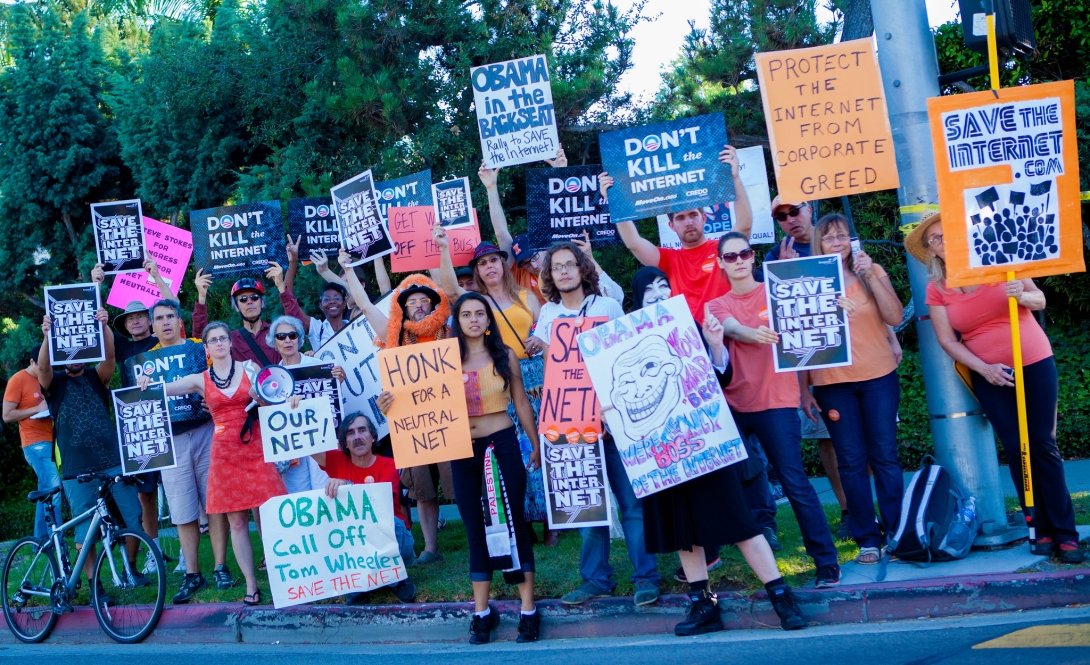11 Key Moments in the Net Neutrality Fight

Activists in L.A. urge President Obama to speak out for real Net Neutrality.
Stacie Isabella Turk/Ribbonhead
1. Verizon court decision and 1 million signatures in 2 weeks
It all began in January 2014, when a D.C. court struck down the FCC’s Open Internet Order in Verizon vs. FCC, effectively killing Net Neutrality. The outrage was widespread and set the tone for the entire debate moving forward. Instead of accepting the ruling as a defeat, advocates began pushing for a real, permanent solution: reclassifying broadband access providers as common carriers under Title II of the Communications Act.
Within two weeks more than a million people called on the FCC to do just that, and a broad coalition delivered the signatures on the day of the agency’s first open meeting of the year. It was the first of many FCC meetings in 2014 that Net Neutrality supporters overtook — both inside and outside the building.
Watch the video of that first petition delivery here.
2. Comcast tries to buy Time Warner Cable
In February, Comcast — the nation’s #1 cable and internet company — announced its intention to take over Time Warner Cable — the #2 cable provider. Comcast touted the many supposed benefits to consumers, but this deal would do nothing but raise prices, kill diversity and diminish choice.
People in the United States have twice voted Comcast the “Worst Company in America,” and for good reason: It’s known for bottom-of-the-barrel customer service and spiraling prices, not innovation. If the government signs off on this merger, Comcast will have unprecedented control over what we see and do online.
3. FCC Chairman Tom Wheeler releases his rules
On May 15, Wheeler proposed rules that would allow rampant discrimination and blocking online. Comcast, AT&T, Verizon and all the other big internet service providers were overjoyed — but everyone else was up in arms.
Free Press rallied with allies and hundreds of activists outside FCC headquarters, and people organized their own protests in 19 communities around the country.
4. Summer to save the internet
By the summer, Net Neutrality was everywhere.
In June, New York held a series of public hearings on the Comcast merger. Sen. Patrick Leahy held a Judiciary Committee field hearing in Vermont to talk about Net Neutrality. The U.S. Conference of Mayors passed a resolution in support of FCC rules banning discrimination online. Efforts were underway at state, local and federal levels to protect Net Neutrality, and activists pushed more and more members of Congress to get on the record about the need for real open-internet rules.
Meanwhile, activists dogged President Obama outside fundraisers in Los Angeles and San Francisco, urging him to live up to his promise to “take a back seat to no one” on the issue of Net Neutrality.
5. Breaking the FCC’s website
The July deadline to comment on Wheeler’s awful rules came — and the FCC site had so much traffic that it crashed, inspiring us to deliver our petitions in person. The millions of people who weighed in — a record-breaking number — were only half of what we brought to the table. The other half was our legal argument and filing at the FCC.
6. Making the legal case for Title II Net Neutrality
In the midst of all the activism and advocacy on the ground, Free Press built the definitive case for real Net Neutrality, skewering misguided attacks on Title II and proving that reclassifying companies like Comcast and Verizon as common carriers would likely boost investment and growth.
7. The internet slowdown
We teamed up with our friends at Demand Progress, Engine Advocacy and Fight for the Future to organize the 24-hour Internet Slowdown.
More than 40,000 websites and platforms, including heavy hitters like Netflix and Etsy, participated in this symbolic protest designed to show the world what the internet could look like without Net Neutrality. Activists all over the country bombarded both the FCC and Congress with calls and emails calling for strong open-internet rules.
8. FCC hearings … without the FCC
It’s been more than five years since all five FCC commissioners left Washington in an official capacity to meet with the public. All year long we urged Wheeler and his colleagues to leave their D.C. bubble and hear from real people about what Net Neutrality means to them.
The FCC ignored us, but our people’s hearings in New York City and San Francisco enabled people from all walks of life to speak out.
9. The cable lobby debunked
All along the cable companies insisted that Title II would prompt network investment to plummet. We poked holes in this argument again and again — and then the ISPs sank their own battleship.
While they can say anything they like to the media, they have to be honest with their investors, and at a shareholders’ conference the major ISPs admitted that Title II would have no negative impact on investment.
10. Obama speaks out
And then came the big game-changer: Obama’s powerful statement advocating for rules based on Title II.
Throughout the year Free Press had pushed political leaders to speak up, but Obama was the big question mark. His announcement put major pressure on Wheeler, an Obama appointee, to do the right thing.
11. Wheeler signals a move to Title II
All of this momentum led to the ultimate twist: Wheeler’s admission last week that he’s likely to base new rules on Title II.
His turn from an industry-friendly approach freaked the cable lobby out, and the weeks remaining before the FCC vote on Feb. 26 will be intense. Some members of Congress are trying to derail the FCC’s momentum; click here to find out where your senators and representatives stand, and urge any Net Neutrality opponents to get out of the FCC’s way.